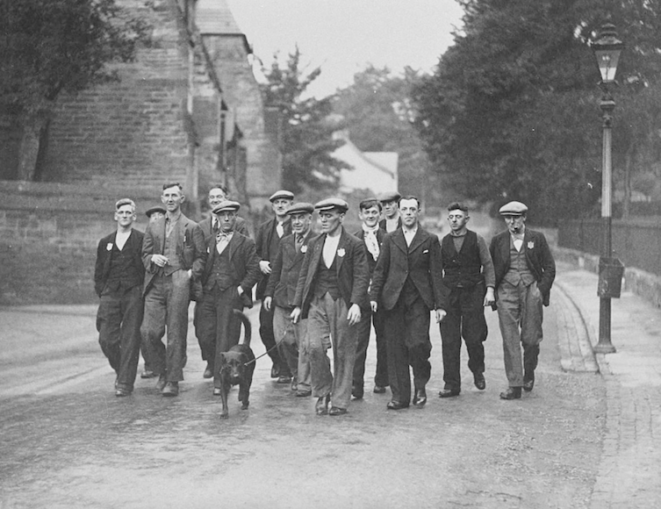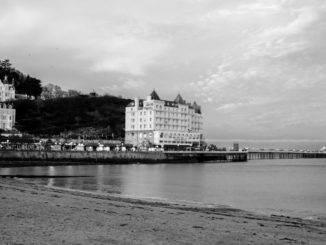“The record of what one man saw and heard and felt on a journey through Britain in October 1947, by John Alldridge”
Uncle John’s record of his trip round Britain, to assess the extent to which the nation was recovering a little more than two years after the end of the War, first appeared in the Manchester Evening News. Sadly, a few of his articles have been cut short as the original copies were corrupted in the archive process – Jerry F
Chapter One – Night Run to Newcastle
Newcastle
How long I had been dozing like that I don’t know. I don’t even remember the moment at which I ceased to be properly awake.
Maybe the beer in that lonely moorland pub was stronger than I thought. Maybe I was overtired. Or maybe it was just a combination of beer and fatigue and the heady smell of petrol fumes in the stuffy driving cab and eyes growing dizzy trying to follow the glow-worm trail ahead.
But suddenly I was awake — violently awake. The brand-new brakes were still shrieking in agony. And across the cab the dim bulk of Bob Proudlock was hauling hard on his wheel and swearing softly to himself. In that same instant the huge lorry came to rest.
Outside the cab the world seemed hung in black velvet, except where our headlights caught and held two vague white shapes that stood stock-still in the middle of the road.
“Horses,” said Bob Proudlock, bitterly. “God knows how they get out. But they do. Come trotting down the road. See you coming. Get the wind up. And like as not charge straight at you. Pal of mine had one jump clean through his windscreen. Just like a circus horse going through a hoop. Horrible mess, it was.”
Then he was down on the road and in a voice suddenly gentle was shooing the trembling animals back into the field.
Outside it was so dark that it made your eyes ache. I lit a match and looked at my watch. Over two hours since we had pulled out of the Manchester garage and into Cheetham Hill. It was cold up here. Below us Yorkshire rose and fell in the darkness like the North Atlantic in November. And the wind made mad music in the unseen telegraph wires.
Bob, suddenly materialising like a friendly ghost in blue dungarees, read my thoughts. “Yonder’s Huddersfield,” pointing to where a broken necklace lay scattered and glittering in a trough between two advancing waves.
A high-pitched whine from far down the road rapidly changed into a threatening roar. A huge mass the size of a house hurtled past us. But not before the horn had blared uptiddy-um-tum and an ironic voice had called down to us: “What do you think this is? Ruddy Lovers’ Lane?”
“That’s Sam Ormroyd going South,” said Bob. “Better get cracking.”
Conversation in the cabin of a 50 horse-power lorry that is hauling 14 tons of jam from Manchester to Newcastle at never much more than 25 miles an hour is difficult. You learn to read your companion’s thoughts. And because you have to shout to hear yourself speak you communicate, like ships at sea, in essentials.
So it took me all of two hours to learn what I wanted to know about Robert Proudlock — that he came from Newcastle, and had been driving lorries for thirty-six of his fifty-six years. His skill at the wheel, his patience and sense of humour, coupled with the physique of a man half his age and an ability to keep his eyes open for eleven hours at a stretch, had made it possible for him to marry and bring up a family and rent a small house with a nice bit of garden where he spends most of his spare time in fine weather.
Materially these things earn him between five and six pounds a week, which is reckoned good money in the road haulage business. In return for this he usually averages four night runs a week.
In that time I also learned that Robert Proudlock, like most men who can do one job well and is allowed by sensible employers to do that one job to his own satisfaction, is a reasonably contented man. What with hauling a lorry from one part of Britain to another and digging in his garden, and maybe taking his wife to the pictures once a week, and going down the street for a pint or two his life is pretty well filled.
Up and down the roads he follows, his headlights pick up giant posters which tell him grimly that he must work or want. Well, he is working, isn’t he — as hard as ever and for better money — and he isn’t wanting for much.
True, the food’s a bit thin and he’s been trying for weeks to buy a pair of grey flannels. But life to Bob Proudlock is still very much what it always was.
Politics? He’s never properly been able to get the hang of them. Not much time or inclination for reading newspapers. In any case you never know where you are with them. Always getting worked up about something.
No, he didn’t vote at the last election. He was off on a job somewhere that day (it’s his fate that he’s either off on a job somewhere or asleep when something momentous happens in the world outside.)
(Last few paragraphs missing – Jerry F)
Chapter Two – The Town That Died
Jarrow
And so we came to Jarrow. We groped our way through a mist that looked like a creeping smoke screen laid down by concentrated mortar fire.
From behind the mist, like machine guns covering the advancing infantry, came the ear-splitting clatter and bark of riveters at work, so that the whole of Tyneside seemed to be joining in the attack, from Gateshead east to Hebburn and back again to Scotswood.
But from Jarrow came never a sound. Call it as quiet as a grave and you would be uncomfortably close to the truth.
Thousands of passionate words have been written about Jarrow. But you will find the whole tragedy summed up perfectly, and with unconscious irony, in one paragraph of Baedeker’s “Great Britain “:
“Jarrow, a town of 32,000 inhabitants, is largely dependent on the shipyard founded in 1851 by Sir Charles Palmer (now closed down).”
Today Palmer’s Yard is not just closed down; it is a heap of decay. You could kick one of those rusty tin cans from the mouldering archway of the main gate straight into what used to be the largest and deepest slipway on the Tyne.

Jarrow Marchers en route to London, 1936,
National Media Museum via mrjohncummings – Licence CC BY-SA 2.0
Logically, of course, Jarrow, from which life officially departed in 1936, should be as dead and done with as Pompeii. I half expected to be taken round by a uniformed guide. Instead I was surprised to find that public meetings are still held in the crumbling Mechanics Institute which Sir Charles Mark Palmer opened just seventy years ago this week; surprised to find that families still live in those terrible little houses near the dead yard.
The truth is that there is more money than ever before coming into Jarrow. The unemployment figures have dropped from 7,500 in 1932 to under a thousand in July this year.
But the money is not earned in the town. It comes from the shipyards of neighbouring Hebburn and from the C.W.S. clothing factory at Pelaw which offers a five-day week and music while you work. North of the town, on the road to South Shields, is an ambitious trading estate which offers well-paid semi-skilled work to young Jarrovians.
Why then, I asked, why then with Jarrow folk earning good money once more does the old town (for there is a brisk new townlet growing up on the Hebburn border) look like something left behind at low tide? Why are so many windows carelessly boarded up for lack of glass? Why are most of the public buildings, from Christ Church to the statue of Sir Charles Mark Palmer himself, covered with the chalk scribblings of aimless children?
I got part of the answer from the headmaster of a local junior school. He told me how many of his youngsters are pushed off to the pictures with a shilling seven times a week and arrive late for school with the excuse that “mother wanted me to put a couple of bob on a horse first.”
“If you break a town’s heart,” said he, “you mustn’t be surprised if sooner or later it loses its self-respect.”
That seems to be the new tragedy of towns like Jarrow. The years of depression drove the best people away from home; these who remain don’t care any more.
Once upon a time Jarrow, with the rest of Tyneside, boasted that it turned out wooden ships and iron men. The ships that Jarrow built in the sixties and seventies are still to be found in the remote harbours of the world. (The first ship launched from Palmer’s Yard in 1852, the “John Bowes,” was finally sunk in a storm off Bilbao in 1933).
Some of the “iron men” linger on, too. They sit in rows on the benches outside Christ Church, gripping sticks in great gnarled hands.
If you talk to them about the crisis, they laugh without bitterness. John Moore, aged 80, and once a foreman plater in Palmer’s, sees in it a sort of poetic justice: “We had our crisis in ’65 and ’98 and again in ’33. You let us die then. Can you expect help now from ghosts?”
If you break a town’s heart you mustn’t be surprised if it loses its self-respect…
Chapter 3 – The Pit And The Pendulum
Seaham
They say here that the coldest wind in England blows off the North Sea. A man coming straight up out of the pit can taste the salt of it as it stings against his lips.
For here at Seaham the collieries stand beside the sea, so that the agent’s office might be just another boarding-house on the promenade.
It was at Seaham that Byron married Anne Milbanke. It was at Seaham that Emanuel Shinwell defeated Ramsay MacDonald in the bitterest election of recent times.
Some of the best thick-seam coal in Britain is mined down here. Most of it goes to the London power stations. And to get it men travel two and a half miles out under the sea-bed.
It used to be Old Testament hell in the bad days. I have talked to middle-aged miners who remember as lads working naked because of the heat and emptying their water bottles eight times in a single shift.
But that is all changed, in many ways these are model pits. Certainly I have seen few in Lancashire to compare with them.
These three pits at Seaham employ five thousand miners — about a thousand less than they employed before the war. Between them they are producing an average of 32,000 tons of coal a week. This is 2,000 tons a week better than the target set by the National Coal Board. But in the opinion of the mining agent it is still well below what it ought to be.
I felt sorry for the worried young agent, with the responsibility of three pits on his hands. He has been a mining engineer all his life and, as his brisk promotion shows, a very good one. But now he says that if anyone is willing to offer him another job which has nothing to do with coal, he’s ready to get out of this one. Twin devils haunt him — the devil of indifference and the devil of frustration.
Every month he takes on sixty men. And every month he loses fifty. His absentee figures are up to 12 per cent some weeks — and only half of these are explained by accident and sickness. The wages of face workers here — aristocrats of the industry — average 35s. a shift. (In 1939 it was £1).
If they work five full shifts a week they get paid as if they had worked six. But a football match or a race meeting will mean that perhaps 500 men will down tools. For a day off work like this, a miner forfeits £3 10s. But the nation loses six tons of coal.
But frustration, which keeps him in his office filling up forms when he ought to be down the pit, is his worst enemy.
“At least before we were nationalised my hands were free,” he says. “If I had an idea I took it before the management and it was either approved or turned down. But today if I want to place an order for a coal-cutter, which will take at least 12 months to arrive, I have to make my application in quintuplicate. If I want to hire an extra hand I have to ask Newcastle.
I asked a Trades Union official what response he got for his sustained efforts. He shrugged his shoulders. “They’ll come to meetings if it’s about pay and working hours. Otherwise it’s just a waste of time holding them.”
Conversations I had with men as they were leaving or going on shift soon developed into worries about rates of pay.
(Last few paragraphs missing – Jerry F)
Reproduced with permission
© 2024 Newspapers.com
Jerry F 2024



